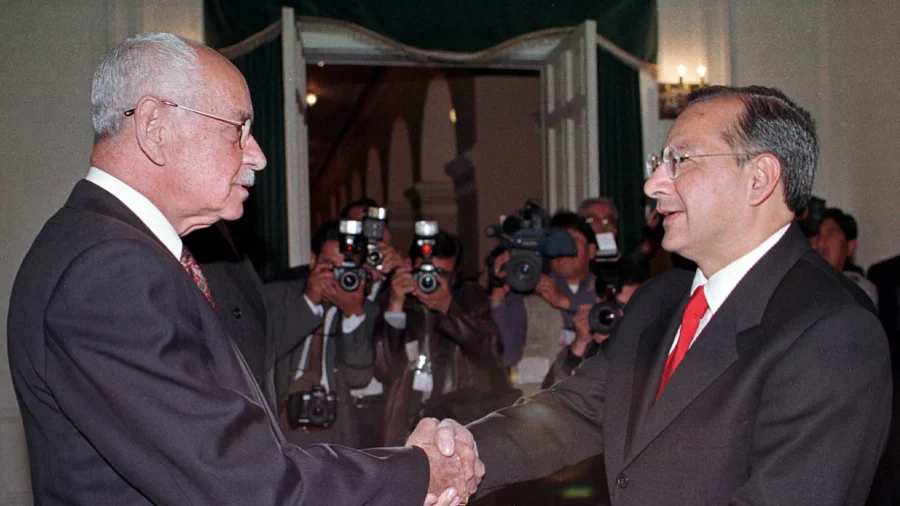A retired career U.S. diplomat has decided to plead guilty to charges of working as an undercover agent of communist Cuba for decades.
The U.S. Attorney’s Office for the Southern District of Florida charged former U.S. diplomat Victor Manuel Rocha, 73, of Miami, Florida in December in a 15-count indictment. His charges included a single count of conspiracy to act as an agent of a foreign government and to defraud the United States; a single count of acting as an illegal agent of a foreign government; five counts of wire fraud; three counts of making false statements in passport applications; four counts of using a passport obtained by false means; and an additional count for making false statements and representations.
Mr. Rocha initially pleaded not guilty to the charges, but on Thursday, his attorneys notified the court that he would change his plea. The prosecutors, in turn, have agreed to drop 13 of the 15 counts.
“I am in agreement,” Mr. Rocha told U.S. District Court Judge Beth Bloom on Thursday, appearing in court with shackles on his hands and ankles.
Prosecutors and Rocha’s attorney indicated the plea deal includes an agreed-upon sentence, but they did not disclose details at the Thursday hearing. He’s scheduled to return to court on April 12, when he will formalize the guilty plea and be sentenced.
Allegations
Mr. Rocha was born in Colombia on Oct. 23, 1950, and became a naturalized U.S. citizen in 1978.
In a complaint filed on Dec. 1, FBI Special Agent Michael Haley of the Miami Division alleged Mr. Rocha began working for the Cuban intelligence service beginning in 1981 and continued for more than 40 years up to the time he was finally charged.
U.S. Attorney General Merrick Garland called Mr. Rocha’s work for Cuba one of the “highest-reaching and longest-lasting infiltrations of the United States government by a foreign agent” in U.S. history.
Mr. Rocha applied for and gained employment with the U.S. State Department in 1981, around the same time his work for the Cuban government began. He continued with the State Department until 2002, with assignments throughout Latin America.
Mr. Rocha’s first post was with the U.S. Embassy in the Dominican Republic, then the U.S. Embassy in Honduras. Between 1989 and 1991, he served as the First Secretary at the U.S. Embassy in Mexico, then returned to the Dominican Republic as the Deputy Chief of Mission for the U.S. Embassy there until July 1994.
Mr. Rocha’s career even caught the attention of President Bill Clinton. Between July 1994 and July 1995, Mr. Rocha served as the Director of Inter-American Affairs on the U.S. National Security Council (NSC). The NSC serves as the principal forum for briefing the president on foreign policy and national security affairs.
While at the NSC, Mr. Rocha’s responsibilities included Cuba, along with the rest of the Americas.
Between 1995 and 1997, Mr. Rocha served as the deputy principal officer at the U.S. interests section in Cuba. He took another embassy posting in Argentina between 1997 and 1999 before being nominated as the U.S. Ambassador to Bolivia, a position he held until August 2002.
After retiring from the State Department, Mr. Rocha advised the U.S. Southern Command (SOUTHCOM) from 2006 to 2012. The U.S. military command’s area of responsibility includes Central and South America and the Caribbean, encompassing Cuba.
The Dec. 1 criminal complaint provides few details about the exact work Mr. Rocha allegedly did on behalf of the Cuban intelligence service but states that his time in the U.S. State Department gave him access to non-public information and he could affect U.S. foreign policy.
According to the complaint, Mr. Rocha’s undercover activities came to light through conversations he had with an undercover FBI agent who posed as a Cuban intelligence officer in 2022 and 2023. The FBI agent was tipped off about Mr. Rocha’s alleged Cuban intelligence ties, and he made contact with Mr. Rocha on Nov. 15, 2022, while the retired diplomat was visiting Cuba.
During a series of in-person meetings between Mr. Rocha and the undercover FBI agent, it’s alleged Mr. Rocha repeatedly described his “decades” of work for the Cuban government and appeared to refer to the United States as “the enemy” while using “we” to describe his actions and those of Cuba.
While Mr. Rocha worked for Cuba’s communist government for decades, it’s alleged he admitted to intentionally portraying himself publicly as “a right-wing person” to help conceal his true intentions.
Sentencing
Often, in counterintelligence cases, the defendant is charged with espionage. But Mr. Rocha was instead charged with the lesser crime of acting as a foreign agent, which can carry a maximum sentence of up to 10 years in prison.
Peter Lapp, who oversaw the FBI counterintelligence mission against Cuba between 1998 and 2005, said the plea deal provides a win-win for both sides as a reduced sentence gives the elderly Mr. Rocha a greater chance to outlive his prison term and likely wins his greater cooperation, providing the United States with a damage assessment of his spying activities.
On the other hand, the plea agreement faces criticism from some in the Cuban exile community who see the deal as overly lenient.
“Any sentence that allows him to see the light of day again would not be justice,” said Carlos Trujillo, a Miami attorney who served as U.S. Ambassador to the Organization of American States during the Trump administration. “He’s a spy for a foreign adversary who put American lives at risk.”
NTD News reached out to Mr. Rocha’s attorneys and federal prosecutors for more details about the plea deal and their sentencing proposal but did not receive a response from either end by press time.
The Associated Press contributed to this article.

